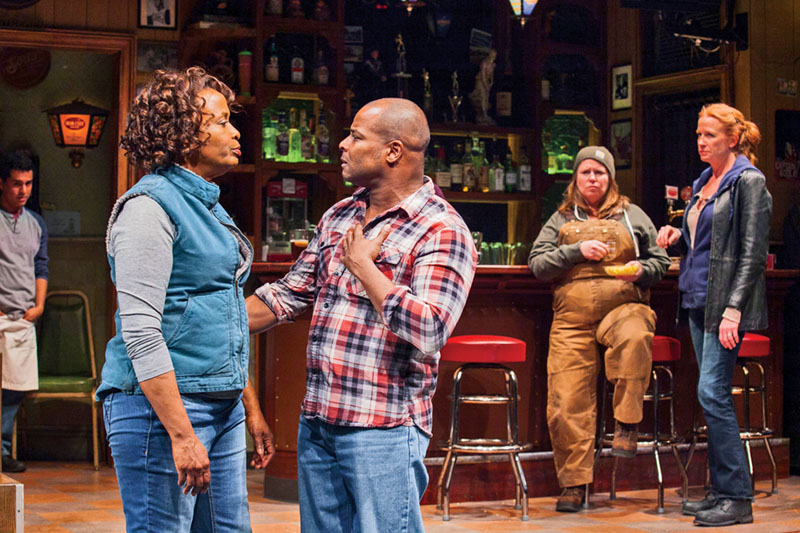Economy of Lives: Sweat at Arena Stage
"Sweat" bears witness to the new-normals of our faceless global economy

One of the most intriguing aspects of contemporary theater is how closely many plays and their productions hue to the tenor of real life, whether it be through dialogue, situations, pacing or set design. In doing so, they are finding relatable, intimate ways to uncover meaning in the places the 21st century has landed us — societally, psychologically, existentially. But like an algebraic equation, each production must find its balance between this quest for realism and deeper goals. If there are no insights into the warp and weft of human experience, then it is little more than artful mimicry.
Lynn Nottage’s Sweat (![]()
![]()
![]()
![]() ) embraces this balancing act and largely gets it right. Set in a small community in which a group of machine workers find themselves caught between their union and their employer, Nottage bears witness to the new-normals of our faceless global economy. Policies may be set at distant, Olympian heights but they touch every aspect of daily life, from what we pay for milk to whether we can get a mortgage or keep a job. It is a new order, one that doesn’t account for ruinous payday loans, fatal gaps in resumes, or human frailties. It is not just God that is dead, Nottage tells us, it is self-determination, not just for nation-states but for people.
) embraces this balancing act and largely gets it right. Set in a small community in which a group of machine workers find themselves caught between their union and their employer, Nottage bears witness to the new-normals of our faceless global economy. Policies may be set at distant, Olympian heights but they touch every aspect of daily life, from what we pay for milk to whether we can get a mortgage or keep a job. It is a new order, one that doesn’t account for ruinous payday loans, fatal gaps in resumes, or human frailties. It is not just God that is dead, Nottage tells us, it is self-determination, not just for nation-states but for people.
These are far-reaching themes, but Nottage brings them seamlessly into the lives of her compelling characters via evenings in the local tavern (given fine detail by John Lee Beatty’s sets), references in the TV news playing over the bar, and projections signaling the passage of time. With her superb ear, Nottage strikes a gratifying balance between realistic dialogue and the arrival of deeper contemplations through finely-constructed monologues. With director Kate Whoriskey’s equally sensitive hand, it almost never sounds contrived and the intimacy is almost always palpable.
Of course it must be said that Nottage’s primary plot-driver is the rather hackneyed one of a promising young African-American (Chris) being dragged into an unoriginal kind of trouble by his ignorant white buddy (Jason). And, yes, there are some moments that veer briefly into sitcom territory with their predictable humor and aw-shucks pathos. These are here, no doubt, to broaden the play’s appeal. But thankfully, Nottage does not let them dumb it down, especially when it comes to issues of race amid these complex relationships.
The components are very much in place. But what breathes not just life, but fire, into this production is Johanna Day’s portrayal of Tracey, one of the workers standing at the crossroads of all this change. As white-townie as it gets, Tracey has the swagger of a territory marked in generations but the smarts to see (even if she will never admit it) that it is no longer enough. Values have shifted and it is her very identity, once her source of pride, that now makes her profoundly vulnerable. Day embodies this woman’s contradictions with extraordinary capacity, moving between Tracey’s whip-fast wit and her ready (and near-bottomless) well of anger, her alley-cat bravery and the self-sabotage that threatens herself and everything she loves. It is a beautifully drawn portrait, beautifully rendered.
At the other end of Nottage’s character spectrum is another rich and absorbing performance, this one from Tramell Tillman as Chris. With extraordinary credibility, Tillman captures this man’s nervous intelligence, the careful way he navigates a world that he knows could, and might just, consume him. Exuding his vulnerabilities, but also his immense charm, Tillman has us rooting for Chris, which Nottage needs if she is to tell her tale with true emotional power and integrity.
Another anchor here is Jack Willis in the role of bartender Stan, a man keenly aware of the forces at play before him night after night as the locals try to come to terms with the uncertainty in their lives. Stan is drawn broadly enough to allow cliché, but Willis imbues him with just the right quotient of personal competence and cynicism for Nottage’s kind of stalwart; he’s happy to tend the fire, but if it gets out of control, he will get out of the way — if he can.
Kimberly Scott as Cynthia, mother to Chris, provides a strong counterpoint to Day’s Tracey, a close and longtime friend. But despite being a powerful presence and drawing credible emotion from Cynthia, Scott can’t quite surmount a slight lack of precision in Nottage’s rendering. How this African-American woman made her way into the socially-closed shop of the white townies is given short-shrift and it weakens the impact of the rising tensions relating, not just to race, but to friendship. Nottage also provides too little to explain Cynthia’s unexpected views on God. These are intriguing complexities and they deserved more.
As Chris’ father, Brucie, a man kicked to the curb by life and struggling to maintain his sense of self, Kevin Kenerly is another memorable presence. Fluid and expressive, he offers the kind of command that begs for a Shakespearean monologue. But it does make for a slight disconnect: He really doesn’t sound like a regular Joe who has been driven to stealing from his wife or getting high to escape his despair.
There is a similar incongruence in Stephen Michael Spencer’s portrayal of Jason, Tracey’s son, though for different reasons. Life with Tracey has, without doubt, been one of sharp rebukes, demeaning one-liners, withheld affections and a narrow outlook. Though Spencer delivers the inevitable emotional confusion of this young man, he tends to gild the lily and it dampens the effect. Less is always more, even with a “big” personality.
Still, none of these issues diminish the greater experience here: an up-close-and-personal look at survival in twenty-first century America.
Sweat runs to Feb. 21 at Arena Stage, 1101 Sixth Street, SW, Washington. Tickets are $65 to $118. Call 202-488-3300 or visit arenastage.org.
Support Metro Weekly’s Journalism
These are challenging times for news organizations. And yet it’s crucial we stay active and provide vital resources and information to both our local readers and the world. So won’t you please take a moment and consider supporting Metro Weekly with a membership? For as little as $5 a month, you can help ensure Metro Weekly magazine and MetroWeekly.com remain free, viable resources as we provide the best, most diverse, culturally-resonant LGBTQ coverage in both the D.C. region and around the world. Memberships come with exclusive perks and discounts, your own personal digital delivery of each week’s magazine (and an archive), access to our Member's Lounge when it launches this fall, and exclusive members-only items like Metro Weekly Membership Mugs and Tote Bags! Check out all our membership levels here and please join us today!























You must be logged in to post a comment.